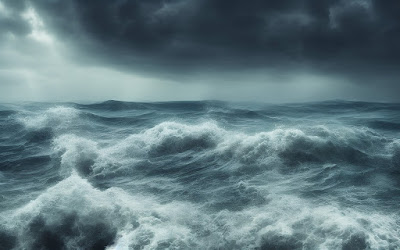Have you ever thought about the storms in Scripture? There are quite a few of them. The first and biggest was the flood in the days of Noah (Genesis 6-8). Noah had the privilege of hearing God’s direct commands to build the ark and take in the animals. But after the door was shut, it seems that God was silent for about a year. I imagine Noah and his family were wondering if the earth would ever reappear or if God had forgotten them. Eventually God did dry up the land and call Noah out of the ark.
Another familiar storm was the result of Jonah’s disobedience and fleeing from his call to Nineveh. The others in the ship somehow knew that this storm had a purpose behind it, and they cast lots to find out whose fault it was. Jonah was apparently ready to die in the sea, but God rescued him with a great fish. It’s not clear whether Jonah actually learned his lesson or not. He did what God commanded, but grumbled about it to the end.
In the Gospels there are a couple storms mentioned. In the first, the disciples were headed across the lake while Jesus was asleep in the boat. A storm arose that frightened even the experienced fishermen among them. They woke Jesus, who stilled the storm and then asked them, “Where is your faith?” Their response was to marvel, “Who then is this, that He commands even the winds and water, and they obey Him?” (Luke 8:25).
Later on, Jesus sent the disciples into the boat alone while He took time to pray. When He came walking on the sea, they were terrified, “but immediately Jesus spoke to them, saying, ‘Take heart; it is I. Do not be afraid” (Matt. 14:27). Peter was bold enough to get out of the boat, but began to sink when he took his eyes off Jesus. This storm ended with the disciples worshiping Jesus, saying, “Truly You are the Son of God” (v. 33).
One other prominent storm occurred with the Apostle Paul in
Acts 27. The crew of the ship made an ill-advised decision to leave port and
ended up in a major storm that lasted at least two weeks. Under divine guidance, Paul urged them to
stay with the ship and to eat when they could. They finally ran aground and
managed to make it to shore on the debris of the ship with all lives saved.
From just these few examples, we see that the storms of life may be a result of individual sin (Jonah), the sin of the multitudes (Noah), bad decisions (Acts), to reveal the Savior (the disciples), or for other unknown reasons. In Finding Jesus in the Storm, John Swinton writes “Retrospective spiritual direction allows people to see where God was in the midst of the storms and to help them use that knowledge as an encouragement and source of hope now and for the future” (p. 214). While I agree with that in principle, I know that it’s easier to see how God was at work after the fact than it is during the storm. When you’re focused on survival, it can be hard to remember God’s faithfulness. When you’re busy bailing water, you don’t always remember the blessings of nets full of fish (John 21:6-7) or deliverance from danger (2 Cor. 11:25-30).
Like David we may be saying, “Save me, O God! For the waters have come up to my neck. I sink in deep mire, where there is no foothold; I have come into deep waters, and the flood sweeps over me” (Psalm 69:1-2). Whether the storm is physical, mental, emotional, or relational, there is a spiritual aspect to it. Storms test our faith and our understanding of who God is and how He will act. C.S. Lewis wrote, “We are not necessarily doubting that God will do the best for us; we are wondering how painful the best will turn out to be” (Letter to Father Peter Bide 4/19/59, Collected Letters Vol. 3).
When we struggle to remember God’s presence and we doubt His care, we need others who can remind us of the truth—not just quoting Scripture at us or speculating as to what God is up to, but walking with us through the storm, embodying God’s love and grace, and praying for God to sustain us in the darkest of nights. We need more people like that in our churches.
“When you pass through the waters, I will be with you; and through the rivers, they shall not overwhelm you” (Isaiah 43:2).
© 2022 Dawn Rutan. Unless otherwise indicated, all Scripture are ESV and all images are copyright free from pixabay.com. The opinions stated do not necessarily reflect the views of my church or employer.
